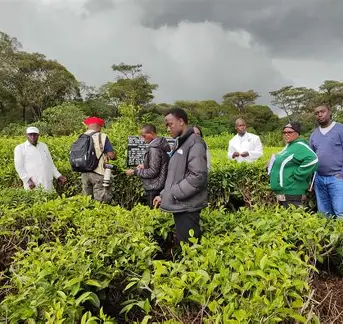
Kenya says it is committed to boosting output in the tea sector to ensure better returns for farmers both in local and international markets.
Agriculture Principal Secretary Paul Rono has assured tea farmers that the government is putting the necessary measures in place to ensure increased value addition and efficiency in all tea factories, noting that this will go a long way in enhancing better prices at the international market.
Speaking at Samoei Boys Secondary School in Nandi Hills, Nandi East Sub-County, during the prayer day for their 2025 KCSE candidates, Dr Rono also revealed that plans were underway to amend the Tea Act 2020 to allow for direct sales in the international market.
This move is aimed at in liberalising the tea industry and protecting tea growers’ proceeds by ensuring direct sales, while ensuring competitive price and adherence to regulations such as maintaining the Kenyan brand at the international market.
“As a government we are committed to ensuring farmers benefit from their tea proceeds. The government will inject Ksh3.7 billion to all the local 19 factories to improve on value addition and their efficiency,” he said.
Secondly amendment of the Tea Bill will allow direct sales from factory to the buyer,” the principal secretary explained. Direct sales to international buyers, he said, will cut off intermediaries and boost farmers profit as well as promote transparency in the market.
According to Kenya Tea Board data for 2024, total earnings from tea grossed Ksh215.21 billion out of which Ksh181.69 billion was earned from exports, Ksh18.00 billion from local consumption and Ksh15.52 billion from committed stocks. This was an increase of 9 per cent from the marketed value of Ksh196.97 billion recorded in 2023.
The data show that from the total marketed value, the exports earnings recorded improved performance by one per cent (Ksh1.12 billion) to stand at Ksh181.69 billion from Ksh180.57 billion recorded in 2023. Higher export earnings were attributed to increased export volume by 14 per cent (71.59 million kilogrammes) from 522.92 million kilogrammes in 2023 to 594.50 million kilogrammes. However, compared to 2023, the export prices and the exchange rate to the US dollar were less favourable to the earnings.
The average export unit price was slightly lower in dollar terms at $2.27 per Kg compared to $2.47 in 2023 while the mean exchange rate of the Kenyan currency to the US dollar was lower at Ksh134.82 compared to Ksh139.85.
He further observed that the government has waived all packaging taxes that prevent value addition to minimise costs, thus ensuring that any increase of the product value is done locally to avoid losing the Kenyan brand to other countries.
“Going forward we will have to package our Kenyan tea and name it by our factory brands. This will attract more investors and make the sweet Kenyan tea price go up,” noted the principal secretary, while calling on the members of national assembly to expedite the amendment of the Tea Bill to boost the sector for more benefits to the farmer.
At the same time, Rono called on farmers who had not yet registered for the government subsidised fertilisers to move with speed and do so at their respective chiefs’ offices so as to benefit from the government subsidised fertiliser, which he said, was now easily accessible in all the National Cereals and Produce Board depots across the country.
“The national government administrative officers (NGAO) are helping to register farmers for the subsidised fertilisers. Ensure you visit their offices if you have not yet listed your land to benefit. This will help you save on the farm input, while ensuring high output,” he added.
- A Tell Media / KNA report / By Ruth Mainye







